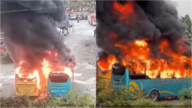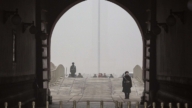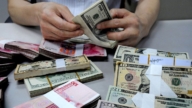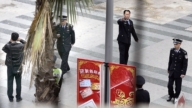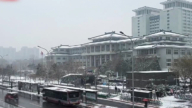【新唐人2012年3月13日讯】两会期间,大陆国家核电技术公司董事长王炳华透露,当局将在年内恢复审批新建核电项目。对此,专家评论指出,人类直到目前还无法安全利用核能,日本福岛核事故刚刚发生一周年,当全世界很多国家都在重新反思核能危机,考虑减少和停止核电站的同时,中共就计划继续大力发展核电,这只能说明中共当局无视民意、不负责任。
3月10号,王炳华在政协记者会上表示,“清华大学”自主研发的项目“高温气冷堆”,将会在今年(2012年)内正式开工建设。他预测,当局将会在年内重启核电站新项目。
对此,“核安全信息交流中心”发起人何岸泉向《新唐人》分析指出,在中国,由于核电“大跃进”形成了巨大的利益团体,他说,王炳华很可能是代表核电利益集团放风,试探国内对恢复核电站审批的反抗程度。但无论如何,他认为,中共当局肯定会在今年年内恢复新建核电站的审批。
何岸泉:“现在的中国(中共)政府没有办法管理这些权贵团体、利益集团,他们要做什么,政府管都管不了。为什么?都被收买了,所有的专家都被收买了,所有的部门都被买通了。”
王炳华还号称:大陆的核电站开发在技术层面没有问题,符合国际和国内核安全的要求。
“中国民主党全委会美国委员会”主席张健:“中国的所有住房质量、学校质量、桥梁质量、食品质量,包括我们的核质量、奶粉质量,等等这些问题,它都宣称:它是世界唯一安全的,它的技术已经达到世界顶尖水平。但是,一旦出事之后,它的问题就来了。”
张健指出,就像“温州7.23特大动车事故”一样,项目上马的时候,当局鼓吹如何安全,等最终出事了,又去找各种借口和替罪羊来推卸罪责。
与大陆的表现截然不同的是,3月11号日本福岛核泄漏事故发生一周年的同时,全球很多地方,包括德国、比利时、匈牙利、香港、台湾等地都有民众发起纪念活动,呼吁废除核能。在日本,大批民众前往国会表达心声:“我们不会忘记大地震,不会忘记﹙核﹚泄漏事故。”
实际上,日本核事故之后,世界很多国家都开始重新反思核能危机,考虑减少和停止核电站。其中,核能技术领先的德国已经宣布停止新建核电站,并将在2022年之前关闭所有核电站。
去年,大陆国务院也曾经决定,暂停新建核电站审批,对核设施进行全面安全大检查。
王炳华在会上提到,这次大检查中,总共发现14个需要整改的问题,但他并没有透露详情
旅德水利专家王维洛:“他只是说14个问题已经调查清楚了,但谁也不知道中国核电站有哪14个问题、都涉及什么东西。它整个这个东西是不透明的。”
王维洛指出,直到现在,核电站的核废料处理问题一直没有得到解决,核电站的安全根本没有保障。
何岸泉也认为,从美国三里岛、苏联切尔诺贝利,到去年的日本核泄漏,这些灾难已经清楚表明,核电站对人类的威胁非常大,而且人类现有技术根本无法避免这类灾难。何岸泉强调,这样的大背景下,大陆当局依然准备核电“大跃进”,只能说,这是个非常不负责任的政府。
另据早先媒体报导,仅2010年深圳“大亚湾核电站”就曾发生多起安全事故,包括核泄漏事故,但当局并没有主动予以通报。
新唐人记者刘惠、李谦、萧宇采访报导。
Fukushima’s Anniversary: China To Push Nuclear Power
At China’s Two Sessions, Wang Binghua, board’ chairman
of State Nuclear Power Technology Co, disclosed its plan.
Wang revealed that the Chinese Communist Party’ (CCP)
authorities will restore the nuclear power projects this year.
Experts commented that mankind still doesn’t know
how to use the nuclear energy safely.
It is one year since Japan’s Fukushima nuclear accident,
and many countries are rethinking the nuclear plants future.
However, the CCP plans are to continue and to vigorously
develop nuclear power, despite public objections.
This is indicative of CCP authorities’ disregard
and irresponsible attitude towards public opinion.
On March 10, Wang Binghua stated during a Politburo
press conference that
Qinghua’s nuclear reactor construction will officially
start this year (2012).
He disclosed that the authorities will restart
nuclear power plant projects during the year.
Nuclear safety information exchange center founder,
He Anquan told NTD that the “Big Leap” on nuclear power formed large interest groups.
He said that Wang Binghua is likely leaking this information
on behalf of the interest groups, to test its resistance in China.
Nevertheless, he thinks the CCP authorities will certainly
restore approval of new nuclear power plants this year.
He Anquan: “Nowadays the CCP government
cannot manage these interest groups.
They do what they want, everyone has been bought,
all the experts and all departments.”
Wang Binghua also claimed: “China’s nuclear power plants’
development has no issues on technical level, which is in line with international and national nuclear safety requirements.”
Chairman of China Democracy Party U.S. Committee,
Zhang Jian commented on the issue.
Zhang Jian: “On the quality of homes, school buildings,
bridges, food, including milk products, and nuclear facilities,
the CCP claims we have the only safe products in the world,
and our technology has reached the world’s top level.
However, once an incident happens,
the issues start to surface.”
Zhang continues: “Like the 7.23 High-Speed Train Accident,
the authorities boasted its safety while building it.
Once big accidents happen, the authorities would
find various excuses and victims to shift responsibility.”
Contrary to China, on March 11, one-year anniversary of
Fukushima nuclear accident, many people initiated commemoration activities in many parts of the world.
Like Germany, Belgium, Hungary, Hong Kong, Taiwan
and other places, calling for abolition of nuclear energy.
In Japan, large numbers of people went to Congress
to make their voice heard.
They proclaimed: “We will not forget the earthquake.
We will not forget the (nuclear) spill.”
After Japan’s nuclear accident, many countries are rethinking
the nuclear crisis, considering closure of nuclear power plants.
Among them is Germany,
which has the leading nuclear power plants technology.
Germany announced a freeze on new nuclear power stations,
and closure of all nuclear power plants before 2022.
Last year, China’s State Council had also decided to suspend
approval of new nuclear power plants, and to conduct a comprehensive safety inspection of nuclear facilities.
Wang Binghua mentioned during the meeting that there are
14 problems to work on. But he did not reveal any details.
Wang Weiluo (Expert, Water Conservation, Germany):
“He only mentioned of 14 problems from the investigation.
But no one knows what the 14 problems of China’s nuclear
plants are, and how big they are. This is not transparent.”
Wang Weiluo pointed out that there is no solution
on the nuclear power plants’ waste as yet.
There is no guarantee of the safety
of the nuclear power plants either.
He Anquan thinks the nuclear disasters at Three Miles Island
in US, Chernobyl in former USSR and Fukushima, Japan,
showed the nuclear power’ great threats to human kind.
Human kind’s technology cannot prevent such disasters.
He Anquan emphasized, Chinese authorities’ approval
of “Big Leap” on nuclear plants in this situation only shows its irresponsibility as a government.
According to media reports, only in 2010 many incidents
occurred at Dayawan Nuclear Plant, including a nuclear leak.
However, the CCP authorities did not proactively report
on those incidents.


